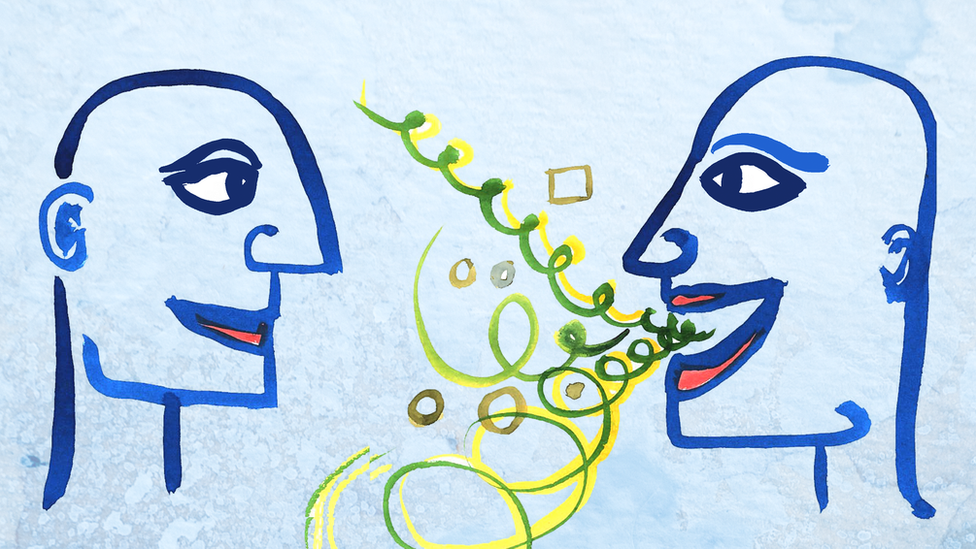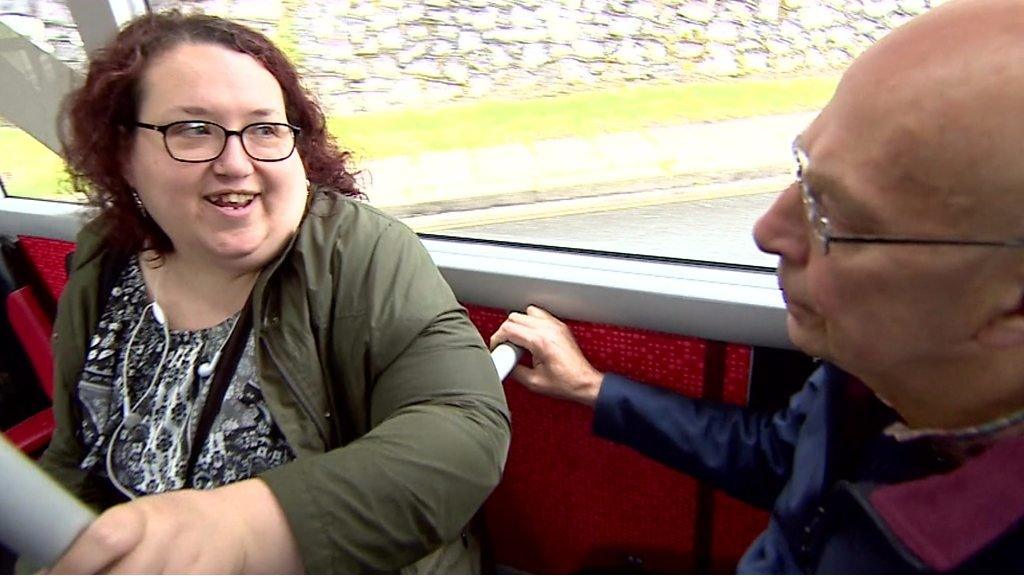Deep listening: Finding common ground with opponents
- Published

Do you find it hard to speak to people when you feel passionately they are wrong?
Whether it's a row over giving up meat to save the planet or simply whose turn it is to wash up, such conversations can lead to a stalemate.
One potential solution is deceptively simple but hard to pull off, especially when you feel sure you are right.
The technique is called deep listening.
It is an approach to difficult conversations that ensures both parties feel fully heard.
Research suggests it can enhance, external the speaker's feeling of wellbeing, as when we are deeply listened to, we can feel valued, accepted and more connected, regardless of whether or not the listener agrees with us.
According to a study in Israel, external, deep listening can also enable the speaker to feel safer, less defensive and therefore more open to seeing both sides of an argument.
Seasoned negotiator Douglas Stone, external trains Harvard Law School students in the technique.
He recalls using it in the 1990s with 40 non-political leaders from Greek and Turkish Cypriot communities.
Many had not seen anyone from the other side of their divided island for 20 years.
"With deep listening, they were able to hear that each person in the room had suffered at the hands of the other," he says.
"And they were able to re-engage the task of seeing the other as human beings again, and not just as 'the enemy'."
So how does the technique differ from ordinary listening?
Deep listening involves being genuinely curious about someone else's story, with a strong desire to understand them.
It's about connecting to them as an individual and establishing trust.
And a simple checking-in process helps keep participants on track.

How deep listening works

Ask your speaker to explain their perspective and why they feel so strongly. Listen, without interruption, putting aside judgements, counter-arguments and solutions
Summarise the core of what you have heard and check you have understood correctly, including the emotions and texture of their story. This does not mean you have to agree
Ask whether they agree with your summary. If not, ask them to explain more
Continue with this process till the speaker gives a resounding "Yes." They should at this point be likely to listen to your side of the story

While researching the technique's effectiveness, academics from the University of Jerusalem read an article about a controversial subject to a group of undergraduates.
Half the students were then paired with a high-quality listener, who used deep-listening technique, while the other half were matched with an inexperienced listener.
The academics found deep listening made the students less extreme in their attitudes, more able to see both the pros and cons of an argument, whether the subject was the Palestinian-Israeli conflict, taxing junk food, or euthanasia.
US-based conflict mediator Gary Friedman, who has spent decades resolving disputes, from angry divorces to property feuds, says critical to successful deep learning is cultivating the "skill of being present".
"This is the act of bringing our full attention to our engagement with our client - which means aligning all our inner resources, our bodies, our feelings, our thoughts in our effort to be open to the client's experience and to deeply feel what they are going through," he says.
With BBC Radio 5 live, the Crossing Divides season has recruited over 200 people from across the UK to be trained in deep listening before being paired with someone with strongly opposing views. BBC News will report on process throughout the day.

A sample deep-listening conversation

Person A: It's horrendous to eat meat nowadays. Look at our precious planet - all these hamburgers are causing our carbon emissions to skyrocket. It's a nightmare.
Person B: I can see you care deeply about protecting planet Earth and are seriously worried about the impact of meat-eating on global warming? Is that right?
A: Yes but not only that - the meat industry is vicious to the animals and slaughters them in cold blood. Animals have every right to live without suffering, just like us.
B: So, for you, your outrage about meat-eating is not just about the environment, you also feel passionately about animal welfare. You believe animals deserve similar rights to people? Did I miss anything?

So what might participants in the BBC experiment expect?
Psychologist Carl Rogers, who pioneered this listening approach, in the 1950s, said listening authentically conveyed the idea of being interested in someone as an individual and thinking their feelings were important.
It showed, he said: "I respect your thoughts and even if I don't agree with them, I know that they are valid for you.
"I feel sure that you have a contribution to make.
"I'm not trying to change you or evaluate you.
"I just want to understand you."
Because of everything it conveys, deep listening can have a profound impact on the person speaking, which is why executive coaches use this technique to enable clients to think more powerfully and creatively.
Psychologist Nancy Kline, a leader in the coaching field, says you can empower someone to think in a transformative way by cultivating an environment of "quiet presence of your attention, respect, and ease", without actually saying anything at all.
You can follow the experiment's progress - and pick up tips -here on the BBC website.
Illustrations: Emily Kasriel

Crossing Divides

A season of stories about bringing people together in a fragmented world.
- Published21 February 2020

- Published17 February 2020

- Published14 June 2019
